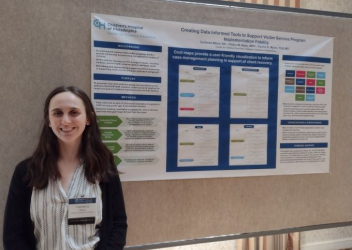Behavioral Science Training
CIRP behavioral scientists work to understand human behavior, using empirical data to investigate how people think, behave, interpret the world, understand their emotions, make decisions, communicate, and relate to others. We consider the social frameworks that affect individuals, from families to communities to the economic and social environment.
Complementing the Center’s engineering and policy work, behavioral science research methods are infused throughout many CIRP research projects and address both prevention of injury, and recovery once an injury occurs. We use a range of methods including: assessing people’s knowledge, attitudes, or mental health symptoms through validated questionnaires and surveys; observing behavior to better understand how people interact with technology, or interactions amongst family members or the health care team; and developing evidence-based interventions to change behaviors or reduce symptoms.
Students in CIRP’s Behavioral Science Training Program may participate in research aimed at preventing injury by promoting safe driving behaviors among teenagers and improving child occupant protection. Students may also participate in research to improve recovery from injury by examining injury-related posttraumatic stress and health-related quality of life, and developing evidence-based information and interventions for children who have experienced a range of injuries including youth concussion and violent injury. An example of our work using behavioral science research methods is After the Injury, CIRP’s award-winning website that gives parents the tools they need to help their children fully recover after an injury.
Learn More
- Student Responsibilities for Behavioral Sciences Training
- Attend weekly project meetings
- Attend regular mentorship meetings (as agreed upon with supervisor)
- Become familiar with research protocols for selected projects
- Screen, recruit, and enroll participants for research protocols
- Perform data management (i.e., data entry and quality assurance)
- Fulfill other assigned responsibilities as appropriate
- Necessary Qualifications for Research Methods for Behavioral Sciences Training
- Students must be enrolled in or have completed an undergraduate or graduate training program.
- Typical undergraduate majors include Psychology, Communications, Pre-Med, and others leading to health professions.
- Typical graduate studies include Psychology, Medicine, Public Health, Communications, Behavioral Science, or other Mental Health-related areas.
- Though not required, knowledge of SPSS (Statistical Package for the Social Sciences), Microsoft Access, and Microsoft Excel is preferred for CIRP's research methods for behavioral sciences training.
Contact Carol Murray, MSS, MLSP, training manager, for more information on CIRP’s Behavioral Sciences Training program.











